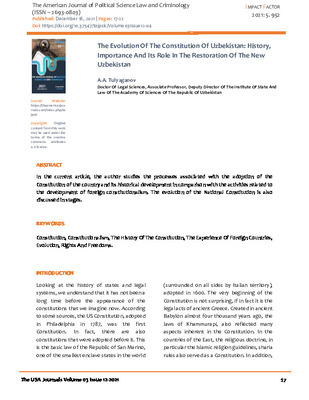The Evolution Of The Constitution Of Uzbekistan: History, Importance And Its Role In The Restoration Of The New Uzbekistan
Abstract
In the current article, the author studies the processes associated with the adoption of the Constitution of the country and its historical development in comparison with the activities related to the development of foreign constitutionalism. The evolution of the National Constitution is also discussed in stages.

Downloads
Doctor Of Legal Sciences, Associate Professor, Deputy Director Of The Institute Of State And Law Of The Academy Of Sciences Of The Republic Of Uzbekistan

Keywords:
Abstract
In the current article, the author studies the processes associated with the adoption of the Constitution of the country and its historical development in comparison with the activities related to the development of foreign constitutionalism. The evolution of the National Constitution is also discussed in stages.
References
Saidov A. New Uzbekistan and sustainable constitutional development. The newspaper Khalk Sozi, issued-November 26, 2020.
Tulyaganov A.A. Amir Temur's ideas on governing the state (based on Temur's rules). T.1997.
https://constitution.uz/oz/pages/Konstitusiyamizning_yaratilishi
Constitution of the Republic of Uzbekistan, Article 1.
https://xs.uz/uzkr/post/millat-tafakkurining-mahsuli
Adams, J. 1787-88. A Defense of the Constitutions of Government of the United States of America. 3 vols. London: Dilly.
Adams, J. 2000. Thoughts on Government. In J. Adams, The Revolutionary Writings of John
Adams. Ed. C.B. Thompson, 287-293. Indianapolis: Liberty Fund. (1st ed. 1776.)
Aristoteles. 1957. Politica. Ed. W.D. Ross. Oxford: Oxford University Press.
Harrington, J. 1977. The Commonwealth of Oceana. In J. Harrington, The Political Works of
James Harrington, Ed. J.G.A. Pocock, 1-266. Cambridge: Cambridge University Press. (1st ed. 1656.)
Livius, T. 1974. Ab urbe condita. Libri I-V. Ed. R.M. Ogilvie. Oxford: Oxford University Press.
Livius, T. 1919. Ab urbe condita. Libri VI-X. Ed. C.F. Walters and R.S. Conway. Oxford:Oxford University Press.
Machiavelli, N. 1531. Discorsi sopra la prima deca di Tito Livio. Rome: Antonio Blado.
Machiavelli, N. 1513. Il Principe. (First print edition 1532. Rome: Antonio Blado)
Milton, J. 1991. Political Writings. Ed. M. Dzelzainis. Cambridge: Cambridge University Press.
Montesquieu, C. de Secondat, baron de la Brede et de. 1748. De l'Esprit des lois. Geneva: Barillot. Plato. 1902. Opera. Ed. I. Burnet. Oxford: Oxford University Press.
Plutarchus, L. Mestrius. 1949-1971. Vitae. Ed. C. Lindskog and K. Ziegler. Leipzig: Teubner.
Polybius. 1922. Historiae. Ed. W.R. Paton. Cambridge, Mass.: Harvard University Press.
Rousseau, J.-J. 1762. Du contrat social. Amsterdam: Marc Michel Rey.
Sallustius Crispus, C. 1931. Bellum Catilinae et Bellum Iugurthinum. Ed. J.C. Rolfe. Cambridge, Mass.: Harvard University Press.
Sellers, M. 1998. The Sacred Fire of Liberty: Republicanism, Liberalism, and the Law. Basingstoke: Macmillan.
Sellers, M. 2009. The Influence of Marcus Tullius Cicero on Modern Legal and Political Ideas. Ciceroniana XIII: 245-80.
Sellers, M. 2014. What is the Rule of Law and Why Is It So Important? In The Legal Doctrines of the Rule of Law and the Legal State. Ed. R. Silkenat, J.E. Hickey, Jr., and P.D. Barenboim.





